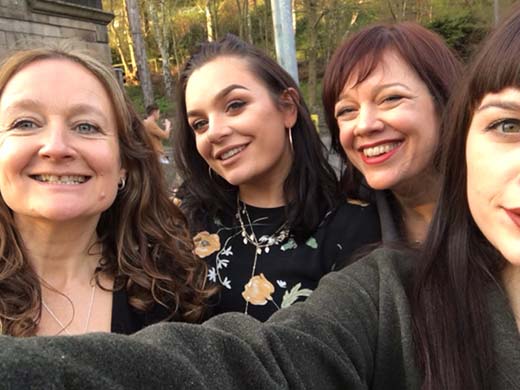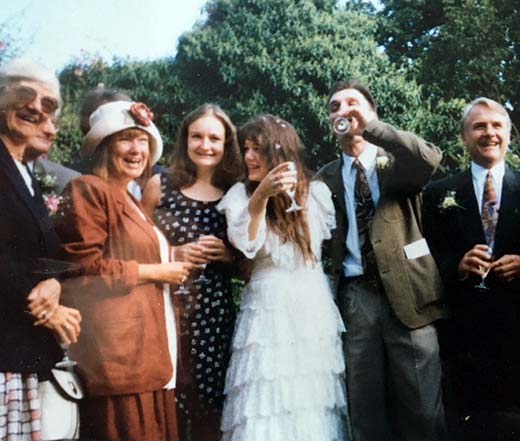
Professor Rebecca Lawton
Local writer and storyteller, George Murphy interviews local characters and personalities
Introduction
I studied Psychology at Nottingham University from 1987-1991, taking a year out to work at International Computers Ltd (ICL) in Manchester. I had a great year learning about how psychology could be applied to real world problems and I also met Kirk, my future husband. At the end of the year, I had decided I wanted to use my understanding of the mind and behaviour to make a difference to peoples’ lives, but I didn't know what direction I would take. I finished my degree and then moved in with Kirk. We lived in Shaw, near Oldham and I took on a job in a local mill, packing clothes, and a bar job to tide me over that summer until I worked out what to do with my life. Then, one day in The Guardian a job advert jumped out.
A Professor James Reason (I didn't know at the time but a very famous academic who has had a huge influence on how we think about organisational safety) was looking for a PhD student to do research on why shunters (the people who couple train carriages together) were dying at the rate of 1 in 1000. I applied and got the post, later finding out that it was not my academic prowess but rather my northern accent (I am from Hull originally) that put me ahead of the other applicants. I would be spending a lot of time in shunting cabins, chatting to shunters and my supervisors (probably wisely) thought it might be better that I didn't come across as too posh. I certainly managed that and I loved my time training to be a shunter and then talking with and watching shunters at work.
Three years flew by and the resulting paper - Not working to rule: Understanding Procedural violations at work- set out the reasons that shunters were being killed at work and, much to the surprise of others, this was not to do with their macho attitude or their sensation seeking, risky approach to work, it was often because it was impossible, given the working conditions, to do the job and follow the rules. This simple message, that to focus simply on the individual characteristics of employees (skills, experience, personality …) rarely improves safety in the workplace, has stuck with me throughout my career.
In 1999, after a few years as a post-doc on short term contracts I got a permanent job as a Lecturer in Psychology at University of Leeds. By this time I had begun to apply my knowledge to safety in healthcare and I also had two children (Emily 3 and Hannah 6 months). I taught students, continued to do research and looked after student admissions until getting promotion to Senior Lecturer in 2004. Around this time, I met an inspiring Consultant doctor and researcher, John Wright, who over the last 18 months has written a moving diary (for BBC Radio 4) about being on the frontline during the pandemic. In 2007, John asked me to come to Bradford Teaching Hospital on a secondment to lead a team of three people to do research on patient safety. This felt like an exciting opportunity, so I accepted. 2007 was a great year for another reason - it was the year we moved to Hebden Bridge - somewhere Kirk and I had wanted to live for a long time.
In 2012, the year my wonderful mum died, I got promotion to Professor, Psychology of Healthcare at the University of Leeds. The team of researchers I lead has increased from 3 in 2007 to 40 today so I am pretty busy but I know I am so lucky to be doing a job I love, and the kids have left home now, so busy is fine.
Professor Rebecca Lawton Q&A
Becky, going in at the deep end, what have been some of the challenges experienced by health professionals that you’ve witnessed during the Covid pandemic?
Perhaps one of the biggest challenges has been redeployment. Doctors, nurses and many other staff have been doing different jobs in new services and working with new people. This is a triple whammy in terms of stressors at work – feelings of incompetence, an unfamiliar working environment and weaker ties with colleagues. Where staff have been trained and supported in their new role this has sometimes compensated for the challenges, but where they haven’t it has been very difficult emotionally.
Then there are those that have had to shield or who are more at risk and so have had to do jobs that are not patient facing. This comes with its own set of challenges – feelings of guilt and frustration - that you cannot help your colleagues and patients.
Other challenges are obvious – the number of Covid patients in the peaks of the pandemic and the number of staff absences has meant very high workload. Staff have been very worried about catching Covid themselves and/or taking it home to their families. Healthcare professionals have also witnessed patients dying (sometimes many patients) and they, like relatives, relive these moments. We are already seeing high levels of burnout in the NHS and I think that this is only likely to increase as a result of the pandemic.
To err is human, but in the health service mistakes can have dire consequences. How do people cope?
Yes, we all make mistakes, particularly if we are tired, multi-tasking, distracted. It doesn’t matter how experienced or intelligent we are. This morning I put soap instead of shampoo on my hair.
When people who work in healthcare make mistakes, this can cause serious harm to patients (as you say) and this is very hard to live with, especially when the reason you do the job is because you want to heal people. There is a term – ‘second victim’ – which refers to the emotional impact that being involved in a patient safety incident has on the staff themselves. In the worst cases, staff experience long term effects such as PTSD, they have to leave the service and some never recover. With support from colleagues and the organization in which they work though, many staff learn from the experience and use it to help change things for the better. We do research on this and develop and evaluate interventions to support healthcare professionals after a patient safety incident.
You oversee a forty strong team, what types of research have they undertaken in response to the crisis?
We have been able to carry on with some of the research that we were doing before the crisis, but some of our work was paused. In response to the crisis we have started two new studies. One, which we got some extra funding to do, investigates how nurses were redeployed during the pandemic at three major NHS Trusts in England. There is almost no guidance for managers and executives on how to redeploy nurses so that they feel supported and happy in their new role and that patients receive the best possible care. Our study explores this. We are hoping to learn not only how to do this in a pandemic but, as the workforce changes, also how do we do this in everyday healthcare settings so that services are adequately staffed.
We have also received funding to investigate how psychological interventions can help critical care nurses recover after the pandemic and how we can prepare junior doctors to cope with some of the stressors they will experience in their working lives. It is all about recovery now.
Can you give examples of adaptations to working practices during the crisis research?
Not yet, it’s a bit too early as we haven’t finished the research yet, but we have presented early findings to nurse managers across the country and they have told us that they really need guidance on fair and effective redeployment practices and this is what we hope to produce. Our aim as a research centre is to develop tools, guidance, new ways of thinking that are useful to frontline staff, managers, patients and policy makers. We have a strong reputation for doing this. I could talk about many examples but I don’t want to bore your readers.
 Right, some lighter fare for a moment. I was intrigued by your Introduction. Talking to you, it sounds as if you enjoyed growing up in Hull, with very supportive parents?
Right, some lighter fare for a moment. I was intrigued by your Introduction. Talking to you, it sounds as if you enjoyed growing up in Hull, with very supportive parents?
My parents were young when they had me and my sister, Elli. They were hippies and they were the most amazing couple and parents. My dad was very involved which was quite unusual at the time. He bathed us, read to us and he even did the ironing. We were loved, we had freedom and we were supported to do what we wanted in life. What more can you ask for. My best friend, Joanne, still lives in Hull so I go back and revisit old haunts. I am heading there next weekend in fact.
As a teenager, did you set out to become a psychologist?
I wanted to be a teacher like my parents and then I met an Educational Psychologist at one of my parents’ parties and I decided to try that. I haven’t become an Educational Psychologist (I changed my mind during my degree) but it certainly set me on the right path.
What was your favourite book?
Wow, what a difficult question. The book I have read most often is Charlotte Bronte’s Jane Eyre. More recently I have discovered Jessie Burton. I love ‘The Miniaturist’. It sweeps you up completely. My daughter, Emily, did her degree in Amsterdam and when I went to visit, I used to search out all the places in the book.
Looking back, have you got an all time favourite TV comedy series?
I don’t like farce. My grandad used to love all that and it just made me cringe. My guilty pleasure is Would I lie to you. I love Bob Mortimer’s unbelievable tales.
Back to research practice again! I’m fascinated by your 3 years looking into the working practices of shunters. Was it necessary for you to immerse yourself fully in their work in order to understand what was causing fatalities?
Yes, surveys and interviews are useful methods, but for this kind of research where I wanted to understand behaviour in context, I needed to develop rapport and trust and to understand what it was like to be in a shunting cabin in the middle of nowhere most of the day and suddenly have to be sharp and focused and doing a dangerous job. I also needed to understand how the bends in the lines made sighting the driver tricky or how there weren’t enough radios for busy periods and how sometimes you had to go between carriages (incredibly risky) because the shunting pole just wasn’t doing the job.
What’s the good and bad of living in Hebden Bridge?
The only bad thing about living in Hebden Bridge is the flooding. There are too many good things to mention. I wouldn’t live anywhere else.

Setting off for 50th at Nelson's with sister,
daughter Hannah & eldest daughter Em
Turning to your other interests, you were heavily engaged with Calderdale Youth Theatre before the pandemic?
Before lockdown I was a volunteer with Calder Valley Youth Theatre. What a lot of fun we had. To work with young people and to see them enjoying and being themselves, being creative, learning and developing was a huge privilege. I was the secretary for the charity, helped with costumes and supervised the kids. Dave and Melissa Mitchell, along with Vicky and Stephen Garrod have been running this group for 20+ years with help from myself, Linda and Stuart Bradshaw and others and in early 2019 we started to look for a new committee. Then Covid struck and Calder Valley Youth Theatre has been on hold for the last 18 months. So, when things start to calm down, we can hopefully pick this up again and find a new group to take Calder Valley Youth Theatre forwards. If anyone out there is interested, please do get in touch with me.
How do you keep fit?
 A lot of dog walking. I take Ozzy, our miniature Schnauzer, out at least twice a day and he loves the hills and woods. Ozzy is quite well known on the park so I often walk or chat with other dog owners (Mel who is new to Hebden Bridge and can be seen dragging Betsy through town, Donna who has the very cute Rosie in tow and many more). I also go to the gym – To The Max Fitness – with my friends (Vicky, Melissa and Linda) from Calder Valley Youth Theatre. We have been with Max since he first started the business and he will probably tell you that we do more chatting than squatting!!
A lot of dog walking. I take Ozzy, our miniature Schnauzer, out at least twice a day and he loves the hills and woods. Ozzy is quite well known on the park so I often walk or chat with other dog owners (Mel who is new to Hebden Bridge and can be seen dragging Betsy through town, Donna who has the very cute Rosie in tow and many more). I also go to the gym – To The Max Fitness – with my friends (Vicky, Melissa and Linda) from Calder Valley Youth Theatre. We have been with Max since he first started the business and he will probably tell you that we do more chatting than squatting!!
My friend Vicky and I also do a 5k run once a week and during lockdown my daughter, Hannah (who studies musical theatre), did online classes for me and my friends and family.
Do you remember your first meeeting with your future spouse?
Yes, we were in a bar in Oldham and we got talking. He had studied in Hull and I am from Hull so we mostly talked about that. We went to ‘Dreamers’ the sticky floored nightclub in Oldham – very romantic. We moved in together a few months later.
I understand yours wasn’t a traditional wedding?

Well, it was at 9.15am at Hull registry office. Not a glamorous location or a great time. We didn’t want to spend a lot on a wedding because we were planning to buy an new house. My wedding dress was £25 from a charity shop. I did my own hair and makeup (it was 8am) and I grabbed some flowers out of a vase before we set off to the registry office. Afterwards, I was outside and my dad offered me a lift back to the family home where we were having a champagne breakfast in the garden (we were all drunk by 11) and I just got in the car and left. Neither of us even thought that it might be bad form to leave without the groom. I have never lived that down.
Have you got a favourite holiday destination?
No. I love travel and I like change so I don’t particularly like going to the same place (although I have been to Venice three times). You just can’t compare the breathtaking scenery of the Lochs of Scotland with the feeling of swimming in a blue ocean in Corfu and drinking a Mythos or cycling across the Brooklyn Bridge in New York. They are all just amazing experiences.
Finally, Becky, could you select a favourite video recording of a piece of music and tell us why you have chosen it?
Van Morrison in concert in 1973 (filmed in London and US). My mum and dad went to see him on tour in Newcastle that year and after my mum died, dad found some solace in watching that video (again and again). The outfits are so 70s, Van is chain smoking, and it really takes you back to a different time where it was all about the music. He was brilliant and the songs really build to a frenzy. I grew up in a house where the record player was on from morning till night and Van Morrison was often playing. Kirk, my husband, is a vinyl fan (though he is less keen on Van Morrison) so the record player is still a big feature of my life but Joy Division has taken over now.
More HebWeb interviews from George Murphy
If you would like to send a message about this interview or suggest ideas for further interviews, please email George Murphy

